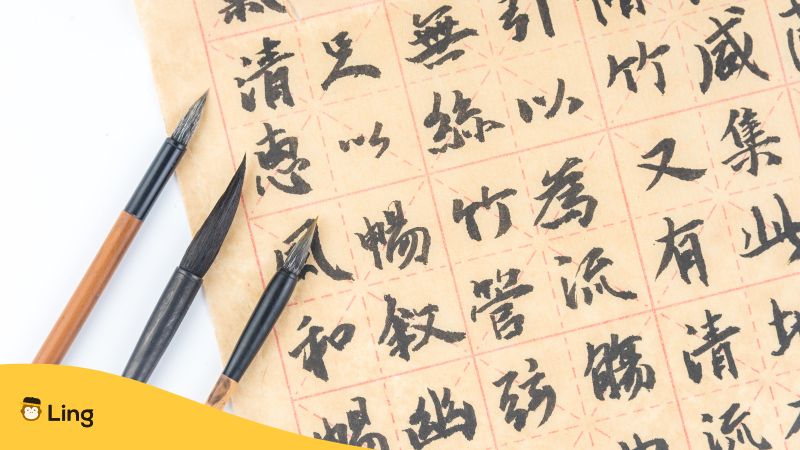Do you want to visit China but have second thoughts because you don’t know any Chinese? If that sounds like you, we have a solution! I’m not going to tell you to start studying Chinese from scratch. Instead, you can learn some conversational Chinese phrases before your trip!
I know that Chinese is one of the most challenging languages to learn. If your goal is to live in China or have a career based on speaking Chinese, you should study Chinese seriously. But, if your goal is to visit China as a traveler, you only need to know common Chinese phrases to get by. The idea is to be able to speak Chinese in a real-life context.
In this article, you’ll learn essential Chinese phrases that will come in handy when you’re visiting China, as well as some brief information about the Chinese language.
Page Contents 📑
- About The Chinese Language
- How To Start A Chinese Conversation?
- Must-Know Conversational Chinese Phrases
- Start Learning Chinese With Ling!

About The Chinese Language
If you are a total stranger to the Chinese language, here are a few fundamental features that you need to know.
Dialects
There are many Chinese dialects: Mandarin Chinese is the most widely spoken and the official language in China, Taiwan (together with Taiwanese), and Singapore; whereas Cantonese is spoken in Hong Kong. That’s why we’ll cover Mandarin phrases in this article.
The bad news is that these Chinese dialects aren’t mutually intelligible. That means you can’t understand Cantonese if you already know Mandarin. They sound very different, with only a few similarities, if any.
Tones
First of all, what is tonal language? A tonal language is a language in which a word is said in different tones; hence, the meaning changes in each tone. Mandarin Chinese is one of those languages, and it has four main tones:
- 1st tone – Flat tone. Example: mā means “mother”
- 2nd tone – Rising tone. Example: má means “hemp”
- 3rd tone – Falling-rising tone. Example: mǎ means “horse”
- 4th tone – Falling tone. Example: mà means “to curse”
Pronunciation
Since Chinese characters are complex, Chinese linguists developed an official romanization system called “pinyin” for Chinese pronunciation. Pinyin converts Chinese characters into a Latin format, using only the 26 letters of the English alphabet so that foreign learners can learn to speak Chinese more easily.
How To Start A Chinese Conversation?
Starting a conversation with a native Chinese speaker can be intimidating if you’re not fluent in the language and they don’t speak English. But some tips can help you get started easily! Let’s have a look at them below:
Greet The Person: A simple “你好” (nǐ hǎo) can go a long way in starting a conversation. This phrase means “hello” and is commonly used in everyday conversations.
Introduce Yourself: Once you have greeted the person, you can introduce yourself by saying “我叫” (wǒ jiào) followed by your name.
Ask How The Person Is Doing: After introducing yourself, you can ask the person how they are doing by saying “你好吗?” (nǐ hǎo ma?). This phrase means “how are you?” which is a common way to start a conversation in Chinese.
Use Simple Phrases: Since you’re not fluent in the Chinese language, it’s best to use simple phrases to avoid confusion. Always stick to basics, just to be safe!
However, when you visit China, you’ll generally find people are very friendly and not shy about asking questions, so you can easily connect with them!

Must-Know Conversational Chinese Phrases
Since you are here to learn some Mandarin Chinese phrases, we’ve collected the most commonly used basic phrases in Chinese to help you get speaking right away once you land in China.
If you also want to learn other basic Chinese words, you can go to our previous blog post!
Greetings And Small Talk
Greetings are one of the first things to learn in any language. They also make up the main part of the basic Chinese phrases you need to know as a traveler in China.
Did you know that Chinese has a few borrowed greeting words from English? They are really similar to their English pronunciations. Check them out here!
- Hi 嗨 (hai)
- Hello 哈罗 (hā luō)
- Hey 嘿 (hēi)
To greet someone at different times of the day, here’s a simple sentence pattern: Time of the day + 好 (hǎo).
好 (hǎo) means good in Mandarin Chinese; that’s why you must include it when you say good morning, good night, etc. But unlike in English, you should reverse the sentence in Chinese. Let me show you some examples here:
- Morning good – 早上 好 (Zǎoshang hǎo) means “good morning”
- Evening good – 晚上 好 (Wǎnshang hǎo) means “good evening”
Introducing Yourself
Rule #1 to make friends: Introduce yourself properly. If you want to connect with Chinese people, you have to learn how to introduce yourself in Mandarin Chinese. People will probably ask what your name is by saying 你叫什么名字? (nǐ jiào shénme míngzi?), and you can answer this question with this simple sentence: 我的名字是 (wǒ de míngzi shì) + name.
Saying your name is not enough to get to know someone! Here are some other useful phrases for you:
When You Don’t understand
Have you ever been in a situation where you’re listening to a fluent native speaker, and you’re just nodding and smiling as if you know what’s going on, but deep down, you’re lost? It happens to all of us! But guess what? There’s an easy way to fix that. Just tell them that you don’t understand, and voilà! After that, they will try to explain it slower and with simpler words.
Asking For Directions
We usually rely on Google Maps, but it’s still a wise thing to know how to ask for and get directions in Chinese. In case your battery dies, or you have no internet connection, you should at least know the cardinal directions!
- East – 东 (dōng)
- West – 西 (xī)
- South – 南 (nán)
- North – 北 (běi)
To say intercardinal directions, simply combine the two directions as in English, but instead of saying northeast, say east-north!
- Northeast – 东北 (dōng běi)
- Northwest – 西北 (xīběi)
- Southeast – 东南 (dōngnán)
- Southwest – 西南 (xīnán)
Plus, here are some phrases to ask for directions and understand in Chinese.
Knowing Chinese prepositions can become handy when reading maps and road signs in a city you’re completely an alien. Locals also use prepositions a lot while giving an address. So, here are the Chinese prepositions you need to learn:

Making A Hotel Reservation
With its rich cultural heritage, beautiful landscapes, and bustling cities, China attracts millions of tourists each year. There are a variety of accommodation options that speaks to different preferences and budgets. From luxury hotels to traditional guesthouses, homestays, and hostels, there are plenty of options to choose from.
Before you learn phrases about making a hotel reservation, let’s see what the Chinese words for accommodations are:
- Hotel – 酒店 (Jiǔdiàn)
- Hostel – 旅馆 (Lǚguǎn)
- Apartment – 公寓 (Gōngyù)
- AirBnb – 爱彼迎 (Ài bǐ yíng)
- Homestay – 寄宿家庭 (Jìsù jiātíng)
- Bungalow – 平房 (Píngfáng)
Hotel reservation is a crucial point for travelers everywhere. Although most receptionists can speak English, you still need to know how to make a reservation in the local language, just in case.
Transportation
I think one of the most problematic issues for travelers is transportation. Especially if the local people don’t speak English at a good level. That’s why I highly recommend you learn a few simple phrases to at least explain where you want to go or what vehicle to take.

Eating Out
Nobody wants to spend time cooking and washing while staying in an Airbnb. Eating out at a fancy local restaurant is much more appealing, isn’t it? Here are some phrases you can use at the restaurant.
Shopping
Shopping at Chinese markets is an exciting experience. But don’t forget to haggle for a bargain in local shops!
Now you are ready to make your first conversations in Chinese! If you want to learn more about the Chinese language and its culture, visit our Chinese blog weekly for new blog posts!
Start Learning Chinese With Ling!
If you’re thinking about learning Chinese or another new language, Ling is here for you!
Ling offers more than 60 foreign language courses, including Chinese! All you have to do is download the app on your mobile device to start learning Chinese right away!
If you’re wondering what you can do with Ling, you can learn how to write Chinese characters, listen to native Chinese speakers repeat their pronunciation, and do various mini-activities to learn Chinese vocabulary and phrases. You can always review what you have learned. Last but not least, you can practice your pronunciation and speaking skills by conversing with chatbots.
Download the Ling app from Google Play Store or Apple App Store now, and start learning Chinese right now!




































































